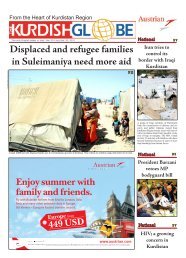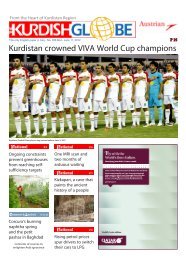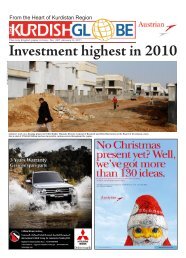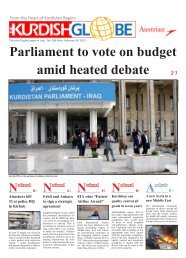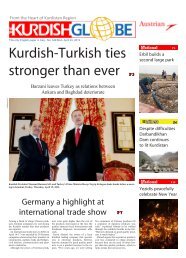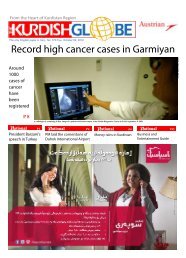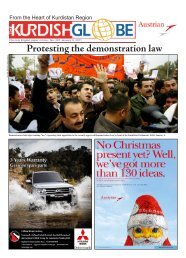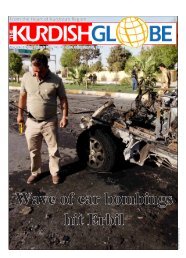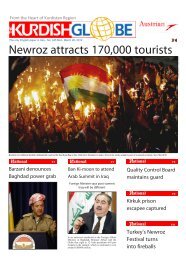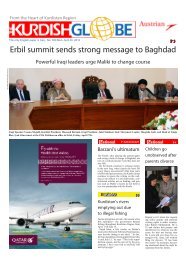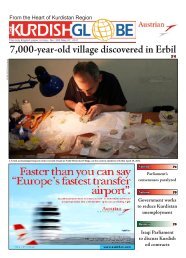Create successful ePaper yourself
Turn your PDF publications into a flip-book with our unique Google optimized e-Paper software.
From the Heart of Kurdistan RegionGLOBE PHOTO/ Safin HamedThe only English paper in Iraq - No: 343 Sat. March 03, 2012NechirvanBarzani woosIslamic Union<strong>National</strong>P 5Kurds urgedto boycottIranian electionThe representatives of the Iranian<strong>Kurdish</strong> parties said they don't havefaith in the election since “only thosecandidates who have the blessing ofthe Iranian Supreme Leader [SayyidAli Khamenei] can win.”<strong>National</strong>P 4Student killsAmerican teacher<strong>National</strong>P 3P 4Syria’s desertersflee to KurdistanBusinessP 7Iraq approves itslargest-ever budgetKurdistan Region’s share in the budgetwas set at 12.6 trillion ID, which is appproximately 11.25 percent of the totalbudget of the country.Incoming Prime Minister Nechirvan Barzani speaks to reporters after meeting with the KIUpolitburo, Erbil, March 1.
The <strong>Kurdish</strong> <strong>Globe</strong> No. 343, Saturday, March 03, 2012 2Kurds: showing a tongue with which totalk, but teeth with which to bite<strong>Globe</strong> EditorialThe Syrian Kurds are in manyways the forgotten kindred ofthe <strong>Kurdish</strong> landscape who havesuddenly found themselves atthe center of increasing regionaland international focus. Indeed,while Kurdistan was forciblypartitioned in the selfish interepest of the imperial powers at thetime, the <strong>Kurdish</strong> national identptity became increasingly morelocalized with the respectivestruggles following suit.It has become a common futpture to be labelled an Iraqi Kurd,Turkish Kurd, Syrian Kurd orIranian Kurd, which in itself isrubbing salt into the wounds ofthe Kurds. They were segregatedagainst their will, and such labpbelling based on their new foundminority status may seem a logicpcal way to distinguish the new<strong>Kurdish</strong> segments, but it simplyaided the assimilation drive ofthe respective occupying forces.At a crucial and sensitive junctpture of the Kurdistan nationalrenaissance, the Kurds have aunique opportunity to rewritethe wrongs of history. While theborders cannot be redrawn overnpnight, the mere conception of theKurds as a disparate force whoseinfluence is limited to their respspective state can be changed.Whether based in Syria, Turkey,Iraq or Iran, a Kurd will alwaysbe a Kurd and successive Kurdipish policies should reflect a comiping together of interests and analliance of different componentsfor the benefit of greater Kurdipish nationalism. The old Kurdipish saying that Kurds have nofriends but the mountains mayhave spoken true in yesteryear,but in the new dawn the Kurdshave each other.Millions of Kurds underBaghdad ruleAlthough the Kurdistan Regionfinds itself in an enviable positption of becoming a prosperous,strategic, political and economicREUTERS/ StringerDemonstrators chant slogans and wave a Kurd flag and pre-Baath Party Syrian flags during a protest against Syria'sPresident Bashar al-Assad in Qudsaya, near Damascus, February 1, 2012. Picture taken February 1, 2012.hub, it is at the end of the dayonly the boundaries of Kurdistanthat have been loosely definedby the Iraqi Constitution.Remarkably, over 40 percent ofthe Kurdistan ethnic border liesoutside of the region that formspart of the so-called disputedterritories. Yet constitutionalarticles that govern how the statptus of these territories is to beresolved have been strategicallystalled by Baghdad in order torestrain the rapid advancementof the Kurds.Four years after the deadlinefor the implementation of Article140, these Kurds still find themspselves no closer to an officialreturn to the Kurdistan Region;to compound matters, they are atthe mercy of insurgents intent onderailing <strong>Kurdish</strong> grip on theseareas.While most Kurds in the Kurdipistan Region enjoy relative stabpbility and welfare, the Kurds outspside of the region do not enjoysuch privileges. Deterioration inthe security of Iraq or any politicpcal vacuums in Baghdad such asthat experienced today ensuresthey get caught up in the whirlwpwind of violence and fear.The <strong>Kurdish</strong> and Iraqi securprity forces have come close tooutright fighting on a number ofoccasions in the disputed areas,and Baghdad has frequently oppposed the presence of Peshmergaforces in the disputed territories.At some point the Kurds have tosay enough is enough.The recent spate of bombingsacross Kirkuk, Nineveh, Salahphaddin and especially Diyalaprovinces continues to highlightthe dangers that Kurds endure inthe face of hard-line groups andArab nationalists.<strong>Kurdish</strong> complaints at the lackof protection from Baghdadare not new and have regularlycalled on the KRG to intercedeon their behalf. Baghdad cannothave it both ways: stalling theresolution of disputed territoriesyet not affording the Kurds theprotection they are entitled tounder their roof.It is time for the KRG to intervpvene more directly in such hotspspots and safeguard the well-beiping of <strong>Kurdish</strong> citizens. Sittingidle or waiting for the goodwillof Baghdad to take place willonly end in disappointment.More importantly, the Kurdshave to grab the bull by thehorns as far as the issue of dispputed territories are concernedand set Baghdad key deadlinesand milestones, whereby if theyfail to deliver then the Kurdswill take matters into their ownhands.Kurds too often have been fearfpful of not upsetting their neighbpbors with respective <strong>Kurdish</strong>headaches or straining ties withBaghdad. However, Kurds havedone as much as anyone to prespserve stability and unity in Iraqand indeed ensure dialogue takesprecedence over violence in Turkpkey. The Kurds should not beany less weary than any othernation to enjoy their legal rightsand make their own demandsand also to enact counter measpsures as they see fit to defendtheir nationality and region.This is not to say that productptive relations with neighbors isnot of paramount importanceas this is key for the economicgrowth of Kurdistan and overapall political stability; however,it means that the Kurds have tobe taken as an important strategpgic power in their own right andas equal partners at the regionaltable. Show that the Kurds havea tongue by which they engagedialogue, but also teeth by whichthey can bite.Plight of Syrian KurdsUnder the increasing limelightare the Syrian Kurds who inmany ways are stuck between anAssad regime that has subjectedthem to systemic repression andArab opposition groups they distptrust.While neighboring Sunni countptries have flocked to stand up fortheir brethren that are subjectto increasing brutality amidst afierce government reprisal, theKurds in Syria have suffered fordecades with much of the worldturning a blind eye.When Arabs defend their brethrpren, the Kurdistan Region shouldbe ready to defend their own.Syrian Kurds look to the Kurdsin Iraq as big brothers, and it isthe duty of Kurdistan Region toembrace them with open arms.As such, the awarding of refugpgee status to 30 Syrian <strong>Kurdish</strong>soldiers who defected is a welcpcome step. The Kurdistan Regpgion should become the naturalhub that Syrian Kurds can use tooppose the Assad regime and enspsure a new democratic and fedeperalist dawn in Syria ensues.Turkey invaded Cyprus in 1974to protect its Turkish inhabitantsand has played a frequent handin ensuring Turkmen interestsare preserved in Iraq, with manyother regional examples that follplow suit. The Kurds cannot stayidle at a unique historical opportptunity to unite all of Kurdistan inpolitics, strategy and spirit.Federalism as a step to unityThe minimum demand of theKurds in Syria should be federapalism. While the Kurds have anundeniable right to self-determinpnation that has been harshly andselfishly deprived, the greatestformula for the overall unity ofKurdistan at the present time isthe establishment of federal regpgion across all countries wherethey find themselves a significpcant minority.A future federal state of Kurdipistan in Syria will undoubtedlyhave a strong alliance with Kurdipistan Region, which will benefitthe entire region in promotinglong-term stability.Bashdar Pusho IsmaeelWeekly paper printed in ErbilFirst published in 2005www.kurdishglobe.netinfo.kurdishglobe@gmail.comAddress:Erbil, Bakhtiyari QuarterEXECUTIVE EDITORJawad QadirEDITORAzad Aminazad.kurdishglobe@gmail.comSenior U.S. EditorSuzanne DeRouensuzi.kurdishglobe@yahoo.comAssociate U.S. EditorElizabeth Schmittelizabethschmitt@earthlink.netSenior U.K. EditorBashdar Pusho Ismaeelbashdar@hotmail.comAko Muhammed+964 750 4661936ako.kurdishglobe@gmail.comAiyob Mawloodi+964 750 4776905aiyob.kurdishglobe@gmail.comQassim Khidhir+964 750 4823081qassim.kurdishglobe@gmail.comSTAFF WRITERSSazan M. Mandalawisazan.kurdishglobe@gmail.comZakaria Muhammed+964 750 475 3897zakaria.kurdishglobe@gmail.comHawzhen Rashadaddin+964 750 4707416hawjin.kurdishglobe@gmail.comARTS EDITORDiyaco Qayoumy +964 750 4036252diyaco.kurdishglobe@gmail.comAdvertisementFor information and prices of ad spots, please contact<strong>Globe</strong>’s Advertisement section: Rizgar Yahyarizgar.kurdishglobe@gmail.comCell: +964 750 4055888You can also check prices and packages by loggingon to: kurdishglobe.net/adSubscriptionThe <strong>Kurdish</strong> <strong>Globe</strong> can be delivered to your office orhome address, whether in Kurdistan or abroad.To subscribe: Please contact the <strong>Globe</strong> DistributionSection: Rauf Aspindarairauf.kurdishglobe@gmail.com+964 750 4497976You can also subscribe by logging onto:kurdishglobe.net/subscription
The <strong>Kurdish</strong> <strong>Globe</strong> No. 343, Saturday, March 03, 2012 3Nechirvan Barzani pays crucial visitKDP Vice President woos KIU ahead of taking office as Prime MinisterGLOBE PHOTO/ Safin HamedKDP Vice President Nechirvan Barzani and KIU Secretary-General Salahaddin Ba’addin meet in Erbil, March 1.Nechirvan Barzani, VicePresident of the Kurdipistan Democratic Party,promised to solve problplems with the KurdistanIslamic Union, breakingfrozen relations betweenthe two parties followingriots in which liquor shopsand KIU offices were despstroyed on December2nd, 2011 in Duhok. TheKIU welcomed Barzani’sinitial peace offer, butdemanded "practical"moves."We will try to solve allthe problems," Barzanitold reporters on Thursdpday after meeting withKIU Secretary-GeneralSalahaddin Baha'ddin inErbil.This visit—the first betptween the two partiessince the Duhok incidentin December—followsBarzani's article publishedon February 25 in whichhe emphasized the necesspsity of leaving differencesbehind for the benefit of"greater interests."Barzani's attempts to appproach the KIU coincidewith his duty to form theKurdistan Regional Govepernment’s 7th cabinet forthe coming two years.Relations between theKDP as a governing partyand the KIU as an oppospsition were stalled follplowing the Duhok eventswhere rioters, who beganat a mosque in Zakho,burned a number of liquorshops and several touristfacilities in Duhok. Laterthe same day, a numberof KIU offices were setablaze. Media outlets belplonging to both the KDPand the KIU blamed eachother for the riots anddamages."This culture of burninga shop or an office mustbe uprooted and terminpnated in Kurdistan," saidBarzani, noting that theevents caused damages toboth parties with the KDPtaking a bigger share ofit. He also admitted therewas “carelessness” in protptecting the KIU offices inDuhok.Barzani hoped the meetiping would become astarting point to rebuildproper relations betweenthe two parties. "Our visitto the KIU [politburo] offpfice carries more meaningthan an apology," Barzanistated in a reply to a questption quoting KIU’s previopous condition for a meetiping with the KDP.Barzani told reportersthat the KIU demandedin the meeting the truthbehind the events, a guarapantee and a mechanism toprevent such events fromreoccurring.Barzani's article"Sooner or later, relatptions between the KDPand the KIU will return tonormal status like before,"said Barzani in his Februapary 25 article. Addressingboth sides, he urged leaviping behind "current tenspsions and complicities."In its first reaction, KIUSpokesman and politburomember Salahaddin Babpbakir announced that hisparty "assesses the articlepositively and takes it asa proper step toward solviping the problems… wehope for practical movesto follow.""These events were unwpwanted, unpleasant forboth of us and worryingfor the people of Kurdistptane; but now we have leftthis difficult time behindand it is time to calmlyand logically plan formaintaining normal andproper relations for thesake of the high interestsof Kurdistan," wrote Barzpzani, asking for the adoptption of "the principle oftolerance" in rebuildingrelations.The Duhok events, asBarzani stated, will not beable to cause cracks betptween the two parties, esppecially as parties' affairsin Kurdistan are regulatedwithin the framework oflaw and the parties sharegreater goals.The burning of the KIUoffices was a "wrong actption," stated Barzani, "itwas not and never is theKDP policy" to carry outsuch attacks. In referenceto the burned liquor shops,he confirmed that the govepernment is responsiblefor protecting people'sproperties and guaranteeiping the security of politicpcal parties. "Meanwhile,the licensed parties mustcommit to the law," statedBarzani.In a part of his article,Barzani praised the roleand importance of theKIU. "The KIU is a licpcensed party and has beenpresent in Kurdistan Parlpliament for several years.It participated in theKRG. It took part severaltimes in joint lists withthe KDP, the PUK andother parties in Kurdistanand Iraqi elections."He spoke of a time whenthe KIU participated inthe KRG's 4th cabinet,run separately by the KDPin Erbil and the PUK inSulaimaniya. The KIU'spresence in that cabinethelped in reducing theimpact of that fracture inthe KRG, said Barzani,adding, "I, as the PrimeMinister of that governmpment, always remembervery well that [role] andnow ask members of theKDP and the KIU to neveper forget these shared relplations between us. Theserelations are much biggerthan the disputes.”He addressed the KDPofficials and memberswhether in governmentor in party organizations"not to act spontaneouslply… but to remain commpmitted to the law even inthe most difficult circumspstances. They should notdefame the governmentand Kurdistan's democrpracy and coexistence.""The KDP respects therights and freedom of anylicensed national party,whether in the governmpment or within the oppposition,” he stated. “Wemust accept each other;be patient and tolerant,particularly at this stage,which is more crucialthan any other time.”Explaining that theKurds should now concpcentrate on national isspsues rather than internalproblems, Barzani added:"Kurdistan's nationalquestion is still there andhas not been resolvedcompletely. All Kurdsare concerned about theexperience of KurdistanRegion. The Kurds can bestrong when this Regionis strong. Rapid eventsin neighboring countrieshave brought about newconditions and they geneperally are positive andbeneficial for the case ofour nation.”Ako MuhammedErbilako.kurdishglobe@gmail.com
The <strong>Kurdish</strong> <strong>Globe</strong> No. 343, Saturday, March 03, 2012 4Former Syrian soldier talks about revolutionSyria’s deserters flee to Kurdistan“We did not haveenough food orenough tents tosleep in, but wehad a lot of brandnew Russianweapons,” adeserter fromthe Syrian specialforce told The<strong>Kurdish</strong> <strong>Globe</strong>.In an old, half-furnishedhouse in Iraqi Kurdistan’sErbil city, a man using thealias Barkhudan Salim isstaying with his brotherand three Syrian friends,one of them another soldpdier who deserted theSyrian army.He was in Brigade 15,which was stationed inthe southern province ofDaraa, one of the coreareas of the Syrian revolplution. “We were under alot of pressure from ourchief officers to kill protptestors. My officer wasalways telling us that wehad to kill demonstrators.He said they were armedterrorists,” said Salim,adding that he did not killanyone. He said his misspsion was to stop and dispperse protestors by firingshots over them.He said there is a cleardivision among Syriansoldiers: Soldiers fromHoms and Daraa refuseto kill protestors, as doKurds and some ArabSunnis, but Alawis andloyalists of Syrian Presidpdent Bashar Al-Assad areGLOBE PHOTO/ Safin HamedBarkhudan Salim, a Syrian soldier who fled to Kurdistan, speaks with The <strong>Kurdish</strong> <strong>Globe</strong>.killing protestors.Alawis, an offshoot ofShiite Islam, are a minoripity community in Syria,from which Al-Assadcomes.Since the revolution begpgan in Syria a year ago,the southern provincesof Homs and Daraa havebecome the heart of therevolution. Currently, thetwo are besieged by theregime’s army and theyare under heavy bombpbardments.Salim said any soldierwho refuses to kill is eitpther executed or arrestedby the army. “In my unit,two soldiers were killedby Bashar’s loyalists. Thesoldiers were my friends,Hozan from Qamihsli andSaleh from Hama. [Theywere killed] because theyrefused our Commandeper’s order to kill protestptors.” He said both of thesoldiers were killed atnight. They were shot inthe back of their head andthe officer blamed armedterrorists. “The officersin the morning told us:‘Look, both of them refpfused to kill terrorists andnow they were killed byterrorists,’” Salim said,adding “but we all knewthey were killed by theofficer.”After six months on duty,the army granted Salim a72-hour leave. When hereturned to his home inAmuda, a <strong>Kurdish</strong> cityin northeastern Syria, hedecided to escape. Withsome help in Syria andfrom his brother in IraqiKurdistan, he was able tosneak across the borderand get to Erbil.He said Assad’s armyis still strong, but he belplieves the army will collplapse within six monthsbecause many soldiersare deserting and are tiredof the situation. “We hada lot of weapons, brandnew Russian weapons,but not enough food andtents to sleep in,” he said.“The soldiers understandthat the situation is outof Al-Assad’s control."He said his brigade was“convoyed by armedmercenaries from Alawisand Iranians.”According to IbrahimBahlawi, a member of aSyrian <strong>Kurdish</strong> Youth Asspsociation with an office inErbil, more than 150 Syripian <strong>Kurdish</strong> soldiers havefled to Iraqi Kurdistanover the past two months.Bahlawi says a lot of<strong>Kurdish</strong> soldiers in Syriawant to desert and go toKurdistan, but crossingthe border, on both sides,Syria and Iraq, is difficult.“A month ago, a soldier,Hogr Hawar Muhammad,deserted his post in theSyrian army and crossedthe border into Kurdistan.Then he was arrested byKurdistan authorities forcrossing the border illegpgally and sentenced to sixmonths in prison,” saidBahlawi.Bahlawi called on autpthorities in Baghdad andKurdistan to allow Syripian deserters to enterIraq, because they eitherhave to kill civilians orthey are killed by the regpgime if they stay in Syripia. Bahlawi said anotherone of his friends, also asoldier in Syria, recentlybroke his leg on duty sohe could return home andwould not have to kill civpvilians.Qassim KhidhirErbilqassim.kurdishglobe@gmail.comStudent kills American teacher in SulaimaniyaAn 11th grade studpdent shot his Americpcan teacher to deathbefore shooting himspself in the head onThursday, 1 March2012 in Sulaimaniya.The teacher, JeremiahSmall, died of his injpjuries at a nearby hosppital. The Sulaimaniyacity police said it hasstarted investigatiping this rare incident,which happened at theMedia Private School,a Christian Englishspeakingsecondaryschool.Student witnesses indpdicated that a religiousargument took placebetween the ChristianAmerican teacher andthe Muslim <strong>Kurdish</strong>Beyar Sarwar Talabpbani. The student repportedly drew a pistolhe had hidden underhis clothes and shotthe gym teacher in thehead three times.City Mayor ZanaHama Salih, speakingto reporters, refused tocomment if the incidpdent was a religiouslymotivated one. He despscribed the argumentas a “teacher-studentproblem.”Sulaimaniya PoliceSpokesman Capt.Sarkawt Ahmed saidthe results of the invpvestigation will be annpnounced in the comingdays. He stated thatPolice are also questptioning the students’relatives and the invpvestigation has twoangles: what exactlyhappened and how thegun got into the schoolpremises.Students grieve after a student shot dead his American teacher at a school in Sulaimaniya, March 1, 2012.Reuters/Nali
The <strong>Kurdish</strong> <strong>Globe</strong> No. 343, Saturday, March 03, 2012 6Emigrated Kurds trickle homeChallenges await those who return to a changed KurdistanWhile the qualityof life may differfrom Europeanstandards, theopportunity toreturn to Kurdistanappeals to thosewho once fled.Over the past few decades,young <strong>Kurdish</strong> men and entptire families have left Kurdipistan for Western countriesdue to the region’s pooreconomy and unstable secpcurity. But since the fall ofthe former Baath Regime,Iraq’s Kurdistan Regionhas witnessed ample devpvelopments in its economyand security, spurring thereturn of many of thosewho once fled the region.The sound of constructption reverberates throughopout Erbil in particular andKurdistan in general. Accpcording to government offpficials, $14 billion has beeninvested in the region since2006. Kurdistan now hastwo international airportsin Erbil and Sulaimaniya,and according to the latestfigures published in Kurdipish media, tourists and visitptors coming through Erbil’sairport have blossomed 23percent. Government officpcials say stable security isthe main reason investorschoose Kurdistan insteadof the middle and southernparts of Iraq.After 2003, Erbil sawa reverse immigration ofKurds who returned inhopes of finding emploympment; foreign laborers follplowed suit. Many of theKurds were born abroadand studied there. NarimanMohammed, 22, a collplege student, was born inLondon and speaks fluentEnglish, but his <strong>Kurdish</strong> isspotty. “My family decidedto leave Kurdistan for theUK in 1987 with one child.My father had politicalproblems with the formeraggressive Iraqi Baath Regpgime. Now we are a largefamily,” Mohammed said.He has more British friendsin London than <strong>Kurdish</strong>friends in the region, headded.Mohammed studied primpmary, secondary and highschool in London. Hisfamily could not affordthe thousands of dollars itwould have cost to sendhim to college in the UK,so his father recommendedthat he come to Kurdistanto continue his studies inone of Kurdistan’s statepaidcolleges.The quality of life and liviping standards in Kurdistanare not like that in the devpveloped UK, but Mohammpmed said the rapid growthin Erbil is an encouragingsign and he may stay “evenafter finishing my studies.”Those who return fromabroad sometimes facecultural, healthcare, educpcational and custom differepences and problems.“Forsure there are differencesbetween the educationalsystem in Kurdistan andthe UK. This is troublespsome for me because I amnot familiar with the educatptional system and the waylecturers teach students,”said Mohammed. He alsorecognized the lack of aproper health care systemin Kurdistan and the issueswith health in general. “Iread lots of news about risiping cancer rates and strangediseases in Kurdistan,” hesaid.Sirwa Ali, 19, an undergpgraduate, lived in Norwpway for 12 years. She was7 when her family leftKurdistan. “I was just achild when my family leftKirkuk, the oil-rich city,for Norway.” They movedto Erbil just one year ago,and now she is looking fora job to pay her collegeexpenses. “I want to studyat American University inSulaimaniya, but my famipily cannot afford it. As ateenage girl, I believe thereare some cultural obstaclesahead, like the way returniping girls wear clothes andparents do not let theirgirls go out with boys becpcause this is not allowedby religion. I think peoplehere interfere in everysingle personal issue andwant to know everythingabout others. The way Ilike to wear clothes is justa personal issue,” she said.“Another cultural problemI have faced is about gettpting married. My relativesmight almost force me toget married soon, which Ido not like.”While acclimating to lifein Kurdistan won’t be easy,Ali intends to remain inKurdistan indefinitely andserve her country. Sheconcluded: “I am muchcomfortable with the girlswho have returned fromabroad like me. But ultimpmately, I am in my countryand no one looks at me likea foreigner.”Salih WaladbagiErbilsalihas2006@gmail.comExxon announces 25-year oil deals with KRGExxon’s entryinto the region hasdoubled shareprices of smallercompanies withexisting contracts.Breaking months of silence,ExxonMobil, the world’slargest oil company, annpnounced in its annual reportthat it plans to explore oil inKurdistan Region. The oilgiant first disclosed informpmation about its investmentplans in an announcementback in November 2011by the Kurdistan RegionalGovernment Minister ofNatural Resources. Due tothe central government’soutrage over Exxon Mobpbil’s decision; however,the company remained silplent about the contract andquietly began operationsin the Region. The publplic announcement that itsigned production sharingcontracts (PSCs) with theKRG, allowing the companpny to explore and produceoil in six fields throughoutthe Region came on Februapary 24.“Exploration and productption activities in the Kurdistptan Region of Iraq are goveperned by production sharingPRESS PHOTOOther oil conglomerates likely to follow Exxon MobilExxonMobil's headquarters in Irving, TX.contracts negotiated with theKurdistan Regional Govepernment in 2011,” read thecompany’s annual report."The exploration term is forfive years with the possibilipity of a two-year extension.The production period is 20years with the right to extptend for five years.”The central government ofIraq, which has long stoodagainst KRG’s oil activitpties and vowed to blacklistinternational oil companiesworking in the Region, excpcluded Exxon Mobil fromthe new round of bids fornew exploration contractsin the south of the countptry. It threatened to cancelits service contracts in thesouth and to terminate thecompany’s contract for WestQurna 1 oilfield, but Exxonis still operating in the fieldand recently raised productption by about 150,000 barrprels per day.Exxon’s contract is exppected to be followed byother oil giants. TOTAL, theFrench giant, is consideringinvesting in the Region asthe KRG’s production-shariping contracts become moreattractive than the servicecontracts offered by Baghdpdad.As the number of unlicpcensed blocs decreases inKurdistan, newcomers areleft with one choice, whichis to buy the existing licenseholders.Being the first contractsigned with an internationaloil giant, Exxon’s entry intoKurdistan Region had signpnificant multi-dimensionalimpacts. While it outragedBaghdad and increased tenspsions between Erbil and thecenter, it simultaneouslymade the Kurds more confpfident in their oil activitiesand the future. But it wasalso a message to the centralgovernment that its packapage to oil companies is notcompetitive compared tothe more generous <strong>Kurdish</strong>package. The most recentimpact, which became appparent after the publicationof Exxon’s annual report,was the soar in the shareprices of the existing smalland medium oil companies.Tony Hayward, the CEOof Genel Energy, the largestproducer of oil in KurdistanRegion, said that ExxonMobil’s entry into the indpdustry has doubled the shareprices of some oil companpnies operating in KurdistanRegion. Speaking at a pressconference, he said that dueto the rise in price, they areno longer planning to buyshares of Gulf Keystoneand DNO."We do not intent on doiping another big deal inKurdistan Region. Anyonewho thinks we’re going togo and buy DNO is wrong;we're not,” Hayward toldreporters at a media briefingon Thursday, February 23.“The thing that changed itmost is that Exxon arrived;100 percent inflation in sixmonths. DNO has doubledand GKP has doubled.”Genel is now moving focpcus toward the Middle Eastand Africa to invest its $1.9billion in cash. "I think we'dbe competitively advantptaged because of our Turkipish brand and our Turkishbackground in North Afrprica, because the role thatTurkey's playing in helpingthose countries creates anew future," Hayward said.
The <strong>Kurdish</strong> <strong>Globe</strong> No. 343, Saturday, March 03, 2012 8Dr. Mahmud Othman discussesIraqi political processGLOBE PHOTO/ Rawaz Koyee“Iraqi leaders failed toestablish a prosperous andinstitutionalized country”— Dr. Mahmud OthmanMember of Iraqi Parliament from the Kurdistan coalition bloc, Dr. Mahmud Othman, sits at home during an interview with The <strong>Kurdish</strong> <strong>Globe</strong>.Member of the FederalParliament from the Kurdipistan Alliance and prominpnent political adviser Dr.Mahmud Othman, in aninterview with The Kurdipish <strong>Globe</strong>, discussed theIraqi political process.Othman says Iraqi policpcymakers have failed toestablish a prosperous andinstitutionalized countryfollowing the fall of theformer regime in 2003. Hestates the Constitution isnot implemented the wayit should be, and the politicpcal blocs do not adhere toit.<strong>Globe</strong>: The political confpflict in Iraq does not seemto end. Where is Iraq headiping?Othman: The Iraqi policpcymakers have failed toreestablish a prosperousand institutionalized countptry following the fall ofSaddam Hussein’s regimein 2003. Iraq still cannotbe described as a democpcratic country due to thelack of the principles thata democratic and prosperopous country requires.<strong>Globe</strong>: People voted forthe Constitution to builda new political process forthe future of Iraq. Where isthe role of Constitution inthis situation?Othman: There is aconstitution which is notimplemented the way itshould be, the Iraqi lawmpmakers and politicians donot adhere to the articlesapproved in the Iraqi Conspstitution. We occasionallyhear (Iraqi Prime Minister)Nouri Al-Maliki emphaspsizing the political parties’commitment to the Iraqicharter, but it was the sameAl-Maliki who used tocriticize the Constitutionand even calling it a bombfor Iraqi stability. The truthis that each political blocseeks its own interests, sofor the Kurds it’s our legpgitimate right to go for ourinterests as well.<strong>Globe</strong>: The Sunni partiessay Maliki has taken contptrol over every strategicposition. Is that true? Dothe Kurds feel isolated aswell?Othman: The Shiite bloccraves absolute power inthe country; they intendto establish governance inwhich they have access toall its aspects. The Sunniblocs are isolated fromstrategic decision-makiping positions. As for theKurds, we are a part of theIraqi power-sharing govepernment to a certain extptent, but still are not giventhe share of a real partner.Both the Iraqi army chiefand deputy prime ministerare Kurds, but their jurisdpdictions are limited.<strong>Globe</strong>: What is the solutption, then?Othman: The powersharingdeal has not beensuccessful for the last sevepen years; the ongoing dispputes among the politicalparties testify to the failureof this so-called powersharing.Therefore, theIraqi leaders should seekother alternatives. I believethe current statue of Iraqrequires a government thatis formed by the majority,and then the other partiesmay play the role of an actptive opposition. However,both ruling and oppositionsides must commit to demopocratic principles, meaniping the ruling party willnot go after the oppositionleaders for their politicalperspectives. In return, theopposition leaders shallnot be involved in terroripist actions or collaboratewith insurgent groups asrevenge for their being outof power.<strong>Globe</strong>: The Sunni Arabsare bidding to establishtheir own regions, like theKurdistan Region. How legpgitimate is this step? Whatwould the Shiites do aboutthat?Othman: The Constitptution allows regions toemerge; therefore it is 100percent legitimate. Butwhat is obvious is thatMaliki does not supportestablishing these regionsas he does not believe inthe principle of federalipism. His fundamental planis to establish a strong centptralized power in which hehas a strong grip over allits facets.<strong>Globe</strong>: What are your optptions if Maliki continues toneglect <strong>Kurdish</strong> demands?Othman: Kurds havetaken part in the Iraqi Shiipite-led government since2005. We had so many stratptegic cards that we couldplay to demonstrate our serpriousness about holding onto our righteous demands— withdrawing from thegovernment, for instance— but we used none ofthese cards. We kept talkiping instead, and when youjust talk, without translatiping it into actions, then theother side will no longertake you seriously.<strong>Globe</strong>: At the time offorming this government,the Kurds supported Al-Maliki with the conditionthat he signs 19 demands.Has he signed these dempmands?Othman: I’m not sure ifhe has; I only heard fromDr. Rozh Nuri, the headof <strong>Kurdish</strong> negotiationdelegation, that Al-Malpliki has signed the Kurdipish precondition paper forlending support to himthat includes 19 demands.However, even if he hasnot signed them, Al-Malpliki is not the only perspson or side that should beblamed; we have to blameourselves as well for notputting enough pressureon Al-Maliki’s governmpment to respond to our dempmands. If the Kurds expectthe head of the Council ofMinisters to do what theywant, it will not happen.Therefore, at this point,the <strong>Kurdish</strong> representatptives in Baghdad must putpressure on Al-Maliki’sgovernment and give hima strong message that thisis not acceptable.<strong>Globe</strong>: The <strong>Kurdish</strong> leadepers say the Kurds enjoya close relationship withthe US Administration. Towhat extent has the Kurdipish administration enjoyedUS support since the fallof the former regime?Othman: The Kurdsare not on the Americanadministration’s agenda.America deals with theIraqi government ratherthan the Kurdistan Regpgional Government. It istrue that we have enjoyeda long relationship withthe US administration,and I believe we ought tocontinue working on impproving these ties further.However, when it comesto depending on the US, Ithink the Kurds should notaim high. If the <strong>Kurdish</strong>administration relies onthe US to support its questption, that would be a hugemistake.<strong>Globe</strong>: Article 140 ofthe Constitution, whichis described as road mapto resolve the issue of thedisputed areas, is a dilemmpma. It was supposed to beimplemented in 2007, butfive years have passed, andthe disputed land issue rempmains unresolved. Why?Othman: As I said befpfore, the Iraqi leaders donot believe in the Constitptution and certainly don’tabide by it. Article 140 isa dilemma indeed, and sofar I don’t see any seriouseffort whatsoever towardsits implementation. On thecontrary, the budget that isallocated for implementiping the Article by compenspsating the settlers and dispplaced families is reducedyear by year, and this is theproof that there is no seriopous desire to resolve theissue of the disputed terrpritories.Interviewed byRawaz Koyee
The <strong>Kurdish</strong> <strong>Globe</strong> No. 343, Saturday, March 03, 2012 9Europe resumes deportations30,000 refused asylum-seekers to face possible repatriationEuropean countries areonce again deporting thosewho have failed to obtainrefugee status. Head ofInternational Federationof Iraqi Refugees AmanjAbdulla told The Kurdipish <strong>Globe</strong> that 65 refugeeswill be deported to Iraq inthe coming days. Another30,000 will face possibleforced repatriation. Headded the 65 <strong>Kurdish</strong> asylplum-seekers are those whohave been refused a legalstatus.“The European countptries are launching anotherdeportation campaign,”said Abdulla, wanting the<strong>Kurdish</strong> authorities to usetheir international ties topush for a solution. “Morethan 1,000 <strong>Kurdish</strong> deportepees have returned to theirhomeland since the camppaign was put into practicein 2005.”Abdulla says more than30,000 failed asylumseekers also face possibleforced repatriation and “ifthe government does notdo anything, they will beforcibly deported as well.”Among the deportees sentback to Kurdistan Regionis 39-year-old Akam Amin.“I was in Sweden, I stayedthere for six years, but theSwedish government rejpjected my residency andrefused to take me in as arefugee,” said Amin. He isnow as a truck driver for aprivate company in Kurdipistan, working from 8 a.m.to 8 p.m. He says he spent$20,000 to get to Sweden,but since he was deported,the six years he lived inSweden were wasted.“I was at work, and twopolicemen approached meand asked me to followthem. I was held in a detptainee camp before they depported me,” he says. “AfterI was held for two monthsin a detention camp, wewere eventually sent backto Iraq.”Forced repatriation sometptimes leaves a negativeimpact on the deportees’psychological health, andfigures released by the IFIRindicate that 15 deporteeshave already committedsuicide.“It’s hard to cope withdeportation; many of theasylum-seekers have leftfor Europe seeking a newlife and a new beginning,”Amin said.The authorities in Kurdistptan Region have expressedtheir dissatisfaction withthe deportation campaigns.“We believe deporting asylplum-seekers against theirown wishes is against theUniversal Declaration ofHuman Rights, so we wantthe European countries toput a stop to returning depportees to Iraq,” Kurdistptan Regional GovernmentSpokesman Kawa Mahmudtold The <strong>Globe</strong>.As a reaction to the depportations, Kurdistan’s intpternational airports do notallow any flights carryingdeported asylum-seekers.Instead, they are deportedthrough the Baghdad airpport.The IFIR has accused theIraqi federal governmentof signing deals with Westepern countries to send asylplum-seekers back in returnfor debt forgiveness. “Weasked the Iraqi governmentseveral times to stop thedeals with foreign countptries and to end the problplem,” said Abdulla.Rawaz KoyeeErbilshano_koye@yahoo.comIraqi asylum seekers gather to protest the British government’s forcible deportation strategy inLondon, 2010.PRESS PHOTONIM shows off new KIA modelsPRESS PHOTOThis press photo shows the Kia Rio parked in front of Shanidar Park in Erbil.2012 KIA Rio debuts in KurdistanThe NIM Company, thedistributor agency for KIAcars in Kurdistan Region,held a ceremony last weekto debut its latest models.In a competitive market,with a range of makes andmodels, the KIA Rio sellswell. It is both compactand inexpensive, and hasmany of the safety featptures of the more expenspsive cars.The 2012 KIA Rio featptures a new style with seveperal high-tech additions.Nihad Zakaria, owner ofNIM, said: “The newestKIA Rio in Kurdistan suitsthe tastes of everyone as itcomes in different colorsand with both automaticand manual transmissions.It is very easy to drive anddoesn>t use a lot of gas."Zakaria says the newversion of KIA Rio has afour-cylinder engine forsmooth driving. It alsocomes with a five-yearwarranty and the comppany has all the spareparts available in its warehphouse.Juma>a Abbas, 35, says“I bought a KIA Rio fourmonths ago. At first Iwas not sure if I bought agood car, but now I knowI made the right choice. Ireally like it and feel comfpfortable driving it. I wondpder what the 2012 modelis like.” Driving to workand running his daily errprands, Abbas fills gas onlyonce a week.The small size of the carmakes it suitable to thenarrow, crowded streetsof Kurdistan, says ShilanAbdullah, a secondaryschool teacher. Althoughshe could afford a moreexpensive vehicle, shedoesn>t want to sell herKIA Rio because she likesits petite size. “Driving inthis county is dangerous;the small size of my carhelps prevent many problplems that I would havewith a bigger car.”Zakaria says youngpeople like the KIA Riobecause it has an MP3player, Bluetooth, iPod intptegration, auxiliary inputsand USB capabilities.“I want to buy a Rio becpcause it is not too priceyand has a good stereo systptem. My father promisedto buy me one if I passthis year in university,”said Dler Muhammad,a college student, whilechecking out a KIA Rio ata show in Erbil.Founded in 1944, theKIA Motors Corporatption is Korea>s oldestauto manufacturer. Itproduces more than 2.1million vehicles a yearin 13 manufacturing andassembly operations ineight countries. KIAs aresold and serviced througha network of distributorsand dealers covering 172countries.
The <strong>Kurdish</strong> <strong>Globe</strong> No. 343, Saturday, March 03, 2012 10Students protest new education systemMinistry ofEducation feels thenew system worksin favor of allstudents; no plansyet to reconsiderwithout valid resultsshowing otherwise.Proficient teachers and shortage of building among concernsGLOBE PHOTO/ Safin HamedSince the Iraqi Constitutption permits the KurdistanRegional Government tohave legislation over itsown education, the KRGhas sought to import anadvanced internationaleducation system into theRegion’s educational inspstitutions. The KRG Minipistry of Education was toimplement a new educatption system in 2007, butthe move was suspendeduntil the beginning of the2011/12 academic year.Several other attemptswere made over the lastfew years.Hundreds of studentshave protested against thenew system over the lastfew weeks and gone onstrike in all three provipinces of Erbil, Duhok andSulaimaniya. But the Minipistry of Education reportedthat the system is meant towork in the students’ favorand doesn’t need readjustiping yet again. However,while the Ministry hasrequired the new systemto be tested practically tosee whether positive respsults appear in the nextfew years, student demonspstrations have pushed theMinistry to review its decispsion and perhaps return toSecondary school students hold banners protesting the new educational system, Erbil, February 12.the old system. “If we findthe students’ requests tobe valid, we will certainlymake adjustments in thesystem accordingly,” saidKRG Minister of Educatption Safeen Dizayee.According to the newsystem, students take twoexams: one in the middleand one at the end of thestudy year. In the old systptem, students had to testonly once, in the finals.In both systems, studentshave to repeat exams forsubjects they failed. Theyreceive some grades fromdaily activities, quizzesand class performances byteachers.Protesters claim that itis impossible to apply thisnew system due to toomany obstacles and thestudents believe that theywill be the main victims ofthe new system if it is appplied. The headmaster ofMa’amun Dabbagh Secopondary School in Erbil,Rezan Muhammad thinksthat misunderstanding thesystem is the main reaspson behind the protests.Muhammad blamed someschool headmasters fornot having adequatelyexplained the importanceof the new system to studpdents.“Many schools have ashortage in buildings andlack proficient teachers;despite these issues, thenew system can still be appplied and is more efficientthan the old system, whichis completely outdated,”she noted.The KRG is working tosolve facility issues by allplocating a special budgetto renovate old schoolbuildings in the necessarylocations.In the new system, teachepers are required to evaluapate student performance,but the limited classroomtime and days make it diffpficult to do so effectively,say the students. “Withinthe system, several changepes have been made to textbpbooks and curricula basedon the modern Europeansystem,” Dizayee stated.“The present system ofeducation requires the philplosophy that the studentsare the focal point and eveperything should evolve tomake them more active,explore and question inorder to participate fullyin the process.”Dizayee added, “Westrive to solve students’problems because we arevery concerned aboutthem. The Ministry monitptors performance and fairnpness of teachers by evaluapating students throughsupervisors.” The Minipistry wants to implementthe system gradually, butstudents say they will contptinue to protest if the Minipistry doesn’t listen to theirrequests to abandon thenew system.By: Hangaw RashaddadinGLOBE PHOTO/ Les GoldingA UK masquerade ball benefits Kurdistan’s health careA masquerade charityball, the first of its kinddesigned to shed light onhealth care in Kurdistan,was held on February18 in the UK. The event,organized months priorby the Newcastle Gateshphead Medical Volunteers(NGMV), highlightedthe latest visit of the orgpganization’s team, whichhas visited Kurdistan fivetimes over the past twoyears since its founding toperform hip and knee surgpgeries.Addressing almost 400guests in the NewcastleCivic Center, host IanPayne from ITV said theevent was a celebrationof the volunteer workachieved by NGMV’smedical staff, a “thankyou” for the support toeveryone since the foundiping of NGMV, and an oppportunity to “dig deep intopockets” and raise fundsfor future life-changingoperations.“My uncle, Mam Agha,and sister Sakar were asource of inspiration,” saidProfessor Deiary FraidoonKader, consultant traumaand orthopaedic surgeon,and also the chairman andfounder of NGMV. “Theyinfluenced and encourapaged me to give somethingback to my country. AfterI returned in 2012 with afew surgeons, we realizedwe could help by filling ina small part of the gap inthe health care.”“Initially the project wasself-funded with partialfunding from the BarzaniCharity Foundation; thelast two visits were fundedby the Nechirvan HealthAid Office.”
The <strong>Kurdish</strong> <strong>Globe</strong> No. 343, Saturday, March 03, 2012 11<strong>National</strong>ism, ExxonMobil and Commemorationof legendary <strong>Kurdish</strong> leader BarzaniBy Azad AminAt first glance, readersmay raise eyebrows overthis title in contemplationof what could possibly bethe connection of ExxonMpMobil to nationalism andto <strong>Kurdish</strong> Leader Mustptafa Barzani. In fact, thereare profound connectionsamong the three, and theway these connections devpvelop may determine thepolitical future of Kurdipistan and the <strong>Kurdish</strong> natption.March 1st marks the 33rdanniversary of the death oflegendary <strong>Kurdish</strong> leaderMustafa Barzani. He wasundoubtedly one of themost influential <strong>Kurdish</strong>national leaders of the 20thcentury and is rememberedamong the ranks of othergreat 20th century Kurdipish national leaders suchas Sheikh AbdulselamBarzan, Sheikh MahmoudBarzinji, Sheikh Saeed,Qazi Muhammed, SeyyidRiza and Ali Sher. It is notthe place to go into detailabout the life of Barzaniand his struggle within the<strong>Kurdish</strong> national liberationmovement. For the purppose of subject matter ofthis article, it is sufficientto highlight one of thecrucial legacies of Barzanithat is his uncompromisiping stance on the issue of<strong>Kurdish</strong> territory and sovepereignty over the territory.This is a point that needsfurther clarification.When the <strong>Kurdish</strong> libeperation movement signedan autonomy agreementwith the Iraqi central govepernment in 1970, one issuehad not yet been resolvedbetween the Kurds andthe central government:the demarcation of Kurdipish territories and the contptrol over these territories.While Iraq insisted on notincluding the Province ofKirkuk within the Kurdipistan autonomous region,Mustafa Barzani insistedthat Kirkuk be included.The dispute over the territptory was the main reasonfor the renewal of militptary clashes and eventualcollapse of the whole autptonomy project that endedin 1975 as a result of theinfamous Algiers Agreempment between Iran andIraq. Barzani expressedthat he was ready to losethe whole region for thesake of the Province ofKirkuk. This suggests hisnationalist character thatthe territory of the nationFor the purpose ofsubject matter of thisarticle, it is sufficientto highlight one ofthe crucial legaciesof Barzani that ishis uncompromisingstance on the issue of<strong>Kurdish</strong> territory andsovereignty over theterritory.is not open for bargain andthere was no compromiseover it. It is this legacythat guides the KurdistanRegional Governmentpolicy today with the Iraqicentral government overthe disputed territories incpcluding Kirkuk.<strong>National</strong>ism as a politicalideology or political actption is a highly discussedconcept and far from beiping a consensus over itsdefinition or perception.Though there are variousand sometimes scholarlyconflicting approaches tothe concept, two pointsmay arguably have crucialpositions within nationalipism: the territory and thesovereign control over thedesignated territory that isassumed as the property ofthe nation.Sovereign control overthe territory and the entptitlement over the naturalresources of the territoryin most cases becomethe source of conflict andnationalist contentionbetween states or withinstates. The case of post-Saddam Iraq demonstratesthat very clearly.Conflict between theKRG and the Iraqi centralgovernment over the issueof territory and the entitlempment over the property ofthe natural resources conspstitute a realand profoundcontest betptween the twosides that cannpnot be resolvedwith goodwillof politicalleaders or withthe implementptation of theIraqi Constitptution despitethe fact thatthe Constitutption provideda roadmap.What has beengoing on sincethe fall of Saddpdam’s Iraq isthe contentionbetween twotypes of natptionalism: staten a t i o n a l i s mof Iraq (Arab)versus Kurdipish nationalismof territory andsovereignty.The mainreason behind the lackof a serious effort by theIraqi central governmentto resolve the pending isspsue of disputed territoriesand produce a hydro-carbpbon law is related to thecharacter of Iraqi stateformation that since itsinception has been basedon exclusive state nationapalism always attemptingto be in full sovereigncontrol over the territoryand population. In otherwords, the Iraqi Republicis a typical nation-stateformation with no apathyto share its sovereigntyand power. This typicalnation-state characteristicof Iraq has not altered inthe post-Saddam era in theminds and souls of Iraqipolitical actors nor its burpreaucratic state structure.The Iraqi Constitution inthat sense does not represpsent a genuine state structpture and state formation ofIraq, but is a piece of docupument hanged temporarilythat represents the existingpolitical power balance.The conflict in Iraq is betptween what the Iraqi statereally is (Arab perception)and what is hoped to be(<strong>Kurdish</strong> perception).The conflicting definitption of territorial issuebetween the Kurds andArabs reflects this reality:What the Kurds conceivethe territory in dispute aspart of Kurdistan’s geogrpraphy, the Arabs conceiveto be legitimate Iraqi terrpritory. It is thus the territorprial issue appears as ‘dispputed territories.’ Despitethe fact that the Iraqi Conspstitution included Article140 to resolve the issuethrough a referendum in2007, the issue has not yetbeen dealt with. It is dispputable that the issue canbe resolved according tothe implementation of theappropriate article of theConstitution.The issue of oil and gas,another serious frictionbetween the KRG and theIraqi central government,demonstrates again theconflicting nationalismsthat exist in Iraq. Federalregions’ sovereign entptitlement over the naturalresources is contested byBaghdad, which forcesKurdistan Region to bowunder pressure to give upits sovereign rights overWhat has been goingon since the fall ofSaddam’s Iraq is thecontention betweentwo nationalisms:state nationalism ofIraq (Arab) versus<strong>Kurdish</strong> nationalismof territoryand sovereignty.its own territory.The war of words betptween the KRG’s NaturalResources Ministry withBaghdad’s Oil Ministptry and particularly withDeputy Prime MinisterHussein Shahristani intenspsified with the entry of theoil giant ExxonMobil toKurdistan. Shahristani hasconsidered most of Kurdipistan Region’s oil contractswith foreign companiesas illegal. He argues thatcompanies must obtainpermission from Baghdpdad before striking anydeals with Erbil. <strong>Kurdish</strong>authorities, on the otherhand, rely on the IraqiConstitution, which allplows provinces and federapal regions to run their ownoil and natural resourcesas long as the revenueis shared with Baghdad.Shahristani’s perceptionreduces the KRG rolesolely to an administrativeprovince without any sovepereign and political rightsover its own territory,while the Kurds perceivethemselves as a sovereignregion entitled to its ownnatural resources for thebenefit of the Region.The entry of ExxonMobpbil—a superpower in theoil industry—to Kurdistanand the potential entry ofthe second superpower, theFrench TOTAL, has bothintensified the conflict betptween Erbil and Baghdadand broughtthe issue to aninternationallevel. ExxonMpMobil signeda contract inJuly 2011 withthe KRG Minipistry of Naturpral Resourcesto explore andextract oil fromthe Region’s oilfields. Baghdadreacted angrilyand threatenedto punish ExxoponMobil for itsdecision to entpter Kurdistanwithout priorapproval fromBaghdad.This verbalthreat was putinto action asBaghdad decpcided to excpclude ExxonMpMobil from entering thefourth round of bidding inits oil sector. Faisal Abdullplah, the spokesperson forHussein Shahristani, toldRudaw, a <strong>Kurdish</strong> newsagency, that “ExxonMobilhas violated Iraqi laws bysigning a contract with theKurdistan Region withoutreferring to the centralgovernment; therefore, itwill be excluded from thefourth round of investmentcompetitions.”These two issues of territptory and natural resourcesbetween Erbil and Baghdpdad signify temporalitythe current Iraqi state formpmation. It is bound to disipintegrate as both sides aredetermined not to give uptheir sovereign rights.At the 33rd anniverspsary of legendary Kurdipish leader, with his legacystill alive, the Kurds willnot give up their soverepeign rights over the territptory and natural resources.Entry of global oil firmsto Kurdistan Region indicpcates that the determinatption of Erbil on the issueof oil is now paying off.It is crucial here to highlplight the different charactpters of conflict between theShiites and the Sunnis andbetween the Arabs and theKurds. The ongoing confpflict between the Shiitesand the Sunnis is mainlyabout a power struggleand dominancy. The confpflict between Baghdadand Erbil; however, is theconflict of sovereigntyand nationalisms. Deepepening of quarrels betweenthe Sunnis and the Shiitesmay further contribute tothe disintegration of Iraq.The <strong>Kurdish</strong> political actptors in south Kurdistan todpday should continue theirdetermination to protect<strong>Kurdish</strong> sovereign rightsagainst Baghdad at anycost. It is clear that Iraqcan never truly be a democpcratic federal political entptity in which nations enjoytheir rights. It was establplished on the basis of excpclusive Arab nationalism,and this character did notchange following the collplapse of the Baath Regimein 2003.In parallel with the devpvelopments in Syria andKurdistan of Syria, theKurds and <strong>Kurdish</strong> polplitical actors should seizeexisting opportunities togo their own independentway to determine theirdestiny. An independentKurdistan is not a dreambut an attainable politicalaspiration.
The <strong>Kurdish</strong> <strong>Globe</strong> No. 343, Saturday, March 03, 2012 12Emergent IraqA journey through the north, which is completely reinventingitself after the withdrawal of the AmericansBy Malte HerwigAfter eight yearsof the War againstTerror, the lastAmerican troops havewithdrawn from Iraq.And where does the newlife begin? In Erbil, ofall places, the centerof the region of theeternally oppressedKurds. Porsche,Marriott, and Brioniare already there– a visit to the secretcapital of IraqGLOBE PHOTO/ Safin HamedAt night, when the soldierswith their Kalashnikovshave withdrawn from thegates and only a silverycrescent moon watchesover the crumbling ramppart, the old citadel of Erbpbil becomes a ghost town.Then Mohammed QadrAli, high above, seals thedoor to his small brick cottptage, switches on the televpvision set, and the siegebegins anew.This time it's the hordesof Genghis Khan runningup to the walls of the citadpdel, just a few meters fromAli's vegetable garden. Itwas nearly 800 years ago,and things didn't go wellfor the Mongols. They hadto retreat empty-handed.Alexander the Great hadbetter luck. In 331 B.C., hestayed well clear of the citapadel, defeating the PersianKing Dareious the Thirdnearby. The Battle of Arbpbela wasn't shown on TV,but it was pained by JanBrueghel the Elder. Thelast Americans have comppleted their withdrawaland a construction boomhas begun in the city at thefoot of the old citadel. Thecontrast couldn't be greateper: Below, in the city withover a million inhabitants,luxury hotels and shoppingmalls are being built fromthe ground up. High up onthe hill, Mohammed QadrAli lives with his family,the last citadel residents tohold the fort.The hill doesn't seem likemuch from the outside. Alayer cake around 30 metpters tall, on which severalhundred dilapidated claybuildings are surroundedby a crumbling rampart.But it's ancient. Accordiping to UNESCO, the Citadpdel of Erbil is the oldestA view of the central part of Erbil.continually inhabited sitein all of humanity. Over thecourse of 8,000 years, thisfar-removed patch in NorthIraq has been inhabited bySumerians, Babylonians,Assyrians, Persians, Rompmans, Mongolians, Arabs,and Ottomans.Mohammed Qadr Ali, aKurd, didn't move to theCitadel of Erbil until 1976.Back then, hundreds offamilies were surging itsnarrow alleys and buildipings. They numbers becpcame ever greater whenSaddam Hussein beganto level huge numbers of<strong>Kurdish</strong> villages and thesurvivors fled to the provpvincial capital of Erbil.Caption: The legacy ofErbil – The citadel sitsatop a hill under which theremains of earlier settlempments are buried. In frontof it lie a newly renovatedsquare with a fountain andtower that the taxi driverssimply call "Big Ben".The rich families hadlong moved to the city andbuilt sprawling mansionswhen the city governmentbecame aware of the histptoric treasure they had allplowed to atrophy.Renovations began in theprevious century, but notalways with a fortunatehand. In the 1950s, themedieval mosque was torndown and replaced with aconcrete place of worship.In 1979, Saddam had agiant gate erected in neo-Babylonian style on thesouth side.The hamam, built in1775, was "thoroughlyrenovated" in 19809 – nostone was left in place.And homeowners simpply built walls in the oldpatrician houses, withouttaking their architecturalhistory into account, or leftthe residential buildings todecay. Almost like a westepern inner-city slum.In 2006, the city governmpment put a stop to all this:All citadel inhabitantswere resettled involuntarilply within the space of threedays. Each family wasgiven 4,000 dollars anda suburban house. OnlyMohammed Qadr Ali rempmained above, for he wasneeded.While his wife picks tompmatoes in the vegetablegarden, the family patriaparch sits, in his flowingrobes and cummerbund,beneath an old fig tree,places his hands on hisknee, and explains why hehas to hold down the fort:"It wasn't my decision, itwas my duty."First, there's the giantgray water tank next tohis house, which the Britipish occupiers placed in thecitadel in the 1920s andwhich requires regularmaintenance.And there's something thecurrent city fathers thoughtwas even more important,the millennia-old traditionthat had to persevere. "Isn'tit great that they let a familylive here, and not just somemuseum guards?" asks thegrandfather proudly.It can't be particularlycomfortable in the bungpgalow beneath the watertank, at least not for a ninepersonfamily. "But werepresent the people wholived here for thousands ofyears," calls Rebwar, Ali'soldest son, enthusiasticallply, bouncing little Reder,the third generation, on hisknee.My house, my water tank,my citadel. 8,000 yearsof tradition. The Kurdshaven't always been here,and things haven't alwaysgone well for them. Butnow they seem to have arrprived, for the first time inhistory.The road to Iraq's futureis freshly paved and wellguarded.People travelingfrom the Erbil airport tothe center of the <strong>Kurdish</strong>metropolis in NorthernIraq have to drive aroundconcrete barriers, passthree checkpoints, and thenchange taxis.Then the journey continupues on the open road, pastthe building blocks strewnacross the plain, fromwhich the frames of largerbuildings stick up. At theintersections, signs pointthe way: Bagdad (30 km),Mosul (90 km), Kirkuk(95 km). Names that havebeen imprinted in Westernmemories as names fornothing good.Hardly anyone in the Westhas heard of the city of Erbpbil, though. Friends toldabout the journey hardlymanage to shrug theirshoulders. Most of themonly know wild Kurdistptan from the pages of KarlMay novels and Iraq fromthe nightly news.Fortunately, the expertsfrom the German ForeignOffice are here. One canask them quite openly."In Bagdad, any idiot cancommit a terrorist attack,"is how a German diplompmat describes the securitysituation. "In Mosul, youat least have to have intptermediate skills; in Erbil,you must be a real professpsional."Suddenly, a muted boomcan be heard from afar. Athin black column of smokerises above the rooftops. Itdoesn't look good at firstglance. But we didn't comehere to trust our first glancepes, the glance of the TVcameras that we see everyevening of bloody corpses,destroyed cars, and beardeped terrorist supporters inIraq, imprinted on our retinpnas since 2003.Whatever the "War onTerror" has achieved herein the last eight years – ithas left behind devastationin the heads of Westerntelevision audiences.In the bright midday lightof the Iraqi December sun,you first have to wipe thefog from your eyes – whatthe Americans call the "fogof war" – whose deceptiveeffects were also describedby Von Clausewitz. Youhave to look carefully, behphind the unfamiliar imagesthat involuntarily pop up inone's eyes.Once the fog is gone,you can see: Erbil isn't abombed-out lunarscape,but a major constructionsite.Kempinski, Marriott,Sheraton, Hilton – jackhp>>
The <strong>Kurdish</strong> <strong>Globe</strong> No. 343, Saturday, March 03, 2012 14PRESS PHOTOBesikci’s spirit walksin DiyarbakirBy Mehmed Sabri AkgönülIsmail BesikciAn introductory meeting ofthe Ismail Besikci Foundatption was organized in Diypyarbakir on February 26. Inattendance were Peace andDemocracy Party (BDP)Member of Parliament Leypyla Zana, Head of the Diypyarbakir Municipality Osmpman Baydemir, DiyarbakirSur District Mayor Abdullplah Demirbas, as well asrepresentatives of <strong>Kurdish</strong>NGOs, intellectuals andwriters.The Ismail Besikci Foundpdation was founded on 29November 2011. The firstintroductory meeting tookplace in Sweden on Januapary 14 and the second inIstanbul on February 18.At the meeting, thedeputy of the foundation,Ibrahim Gurbuz, spokeabout objectives, sayingtheir goal was to cherishBesikci's works and legacyvia research in scientific,social and cultural fields,documentation and culturecenters, institutes and amuseum. The foundationplans to organize contestsin several fields for whichthey will give Ismail Bespsikci awards, and thereare plans for media andpublishing activities. Theyalso intend to publish all ofBesikci’s books and translplate them into <strong>Kurdish</strong> andEnglish. He noted that Bespsikci donated his collectionof books, magazines andnewspapers gathered duriping the last 60 years. Gurbpbuz called upon the peopleof Diyarbakir to becomevolunteers to protect thefoundation.In his speech, Baydemirsaid the books of IsmailBesikci had affected hisopinions as much as Kurdipish madrasas, Islamic collpleges and Yerevan, a Kurdipish radio broadcast fromArmenia did. Baydemiremphasized the importanceof the attitude of Besikciin terminating the dark perpriod over the Kurds, addiping, "Besikci is the Galileiof the 20th century for theKurds because he tore thatdark period and illuminatedthe path of the Kurds. EvenGalilei gave some concesspsions to get rid of punishmpment and stepped back. ButBesikci never gave an inchand did not step back." Hedefined the meeting dateas a historical day. "In thisland, they played with conspscience, ethics and cultureof our people. They playedwith every value of theKurds. But Besikci invalidpdated any evil plans againstthe Kurds.”Baydemir said a historicalbuilding inside the city wallwill be restored and theywill do their best to giveit to the foundation. Likewpwise, Mayor Demirbas saidthey will search for a goodplace for the foundation,adding that they consideredBesikci an "honorary comppatriot of the Kurds."Ismail Besikci is the onlyTurkish sociologist whois totally commited to theemancipation of Kurdistptan and speaks loudly andclearly in defense of theright to sovereignty of the<strong>Kurdish</strong> nation in Turkey.Besikci has kept the issueof the <strong>Kurdish</strong> nationalstruggle and Kurdistan asa priority in his scientificstance. His books, articlesand conferences in whichhe participated on the<strong>Kurdish</strong> issue were alwaysobjective, realistic andcourageous. He preparedhis PhD thesis, a sociologicpcal investigation of the lastnomadic Alikan tribe, duriping his assistantship at theAtaturk University in Erzpzurum. His book on Kurdipish society, “The Order ofEast Anatolia,” was firstpublished in 1969. He haspublished 36 books, 32 ofwhich have been banned inTurkey.Besikci advocates thatTurkey has practiced agenocide policy againstthe Kurds over the past 80years. He carried out hisresearch against the Turkipish official ideology, whichdoes not accept the existptence of the Kurds. Facedwith legal actions becauseof his books and articles,he has been imprisonedeight times because of hiswritings and has served 17years in prison. Before 12September 1980, Turkishcoup d'état, he was imprisoponed and later released in1987. However, the lawspsuits did not stop followiping him and he was keptin jail until 1999 at whichpoint he was released as aresult of a legal regulation.Even in the worst conditptions, Besikci has stoodfor what he wrote and saidwithout hesitation. In 2010,he was again prosecutedby the attorney general ofIstanbul for writing an artpticle for a Turkish journaltitled "The right of nationalself-determination and theKurds." He was sentencedto 15 months in prison on4 March 2011. Besikci tellshis truth in the ongoing triapals without compromising,and he continues writing.Besikci did not fight onlyagainst the laws of the Turkipish State; he also struggledagainst Turkish intellectuapals who accused him of beiping achauvinist. He wrotemany articles and booksabout <strong>Kurdish</strong> history andthe <strong>Kurdish</strong> national movempment. He initially supporteped the Kurdistan WorkersParty (PKK) actions and itsarmed struggle. He assertedthe PKK as one of the majpjor figures in the <strong>Kurdish</strong>national struggle and despscribed the first armed actption of the PKK in 1984 as"the first bullet." However,after the capture of PKKLeader Abdullah Ocalanin 1999, when the PKKabandoned the ideology ofindependence and declaredtheir main goal the democrpratization of Turkey, Bespsikci began to criticize thePKK. In this context, hecriticized Ocalan for beingagainst the <strong>Kurdish</strong> State.Insistenly, he urged the<strong>Kurdish</strong> political cadres tofollow a national policy bysaying that the Kurds are anation and Kurdistan is aninternational colony.Besikci was described as"modern Turkey’s pioneerof <strong>Kurdish</strong> studies" byDutch anthropologist Martptin van Bruinessen, whoalso released a number ofpublications on the Kurdipish issue and Kurdistan.Besikci’sbook "Internatptional Colony Kurdistan,"originally published inTurkish in 1990 and translplated into English in 2004,was greeted with interest bythe Kurds both in diasporaand in north Kurdistan. Inthis book, he illustrated twomain groups of colonies inthe history of colonialism:full colonies and semi-coloponies. He argued, however,that Kurdistan is neither afull nor a semi-colony."The political status of the<strong>Kurdish</strong> nation is far lessthan the status of a colony.The Kurds are a people theworld wants to enslave,render devoid of identity,and wipe off the face ofthis earth—along with the<strong>Kurdish</strong> language, culture,and history—until everytrace of <strong>Kurdish</strong> identityhas been eliminated (…)There is no doubt that likemost colonized regions,Kurdistan's stores of rawmaterial, its vast naturalwealth in petroleum, coppper, coal and phosphate,soil, forests, and water areexploited and marketedfor industry. However, inthe case of Kurdistan, anumber of elements notfound in classical coloniescome into play, reducingKurdistan's status belowthat of a colony." (Besikci,2004. pp. 18-19) He discpcussed former colonies ofGreat Britain, as well asPortugal and France, andtheir relation with colonialstates. He noted: "There isa country known as Ugandpda, a former British colony,with defined borders. Thepeople living in this countptry are not British, nor isUganda considered part ofGreat Britain. There wasno attempt to transform thenative people into Englishmpmen. When Uganda gainedits independence followiping constitutional negotiatptions in the late 1960s, itsexisting borders were notaltered. The situation inKurdistan; however, bearsno resemblance to theabove scenario. In none ofthe countries where Kurdsreside were they or are theyconsidered to be Kurds. InTurkey, they are regardedas Turks, in Iran they areconsidered as Persians, andin Iraq and Syria they aresaid to be Arabs. Naturallythis means second-class"Turks," "Persians" and"Arabs." All of these countptries implemented harsh asspsimilation policies and the<strong>Kurdish</strong> identity is deniedwith vehemence. The gainsachieved through the Kurdipish armed struggle in Iranand Iraq are another matterto be dealt with elsewhere."(ibid; p.20)According to Besikci,<strong>Kurdish</strong> nationalism and<strong>Kurdish</strong> patriotism are thesame thing, and it is wrongto tar <strong>Kurdish</strong> nationalismwith the same brush as Turkipish, Arab and Persian ones.Furthermore, he claimsthat Turkey, Iraq, Iran andSyria, jointly suppressingthe Kurds and Kurdistan,desire to obstruct the growiping nationalist tendenciesof the Kurds. In oen ofhis articles, Besikci wrote,"The prominent numberof the Kurds, especiallythe educated ones, utter
The <strong>Kurdish</strong> <strong>Globe</strong>No. 343, Saturday, March 03, 2012 15<strong>Kurdish</strong> clubs pursue Syrian footballersCoaches and playersjoin local teams<strong>Kurdish</strong> clubs are hopiping to hire coaches andfootballers from Syria,which has witnessed polplitical unrest and violencesince early 2011. Over thelast two seasons, the threetop <strong>Kurdish</strong> clubs of Erbil,Zakho and Duhok havesigned contracts with Syripian players and trainers,hoping to strengthen theirteams.Duhok was the firstclub to appoint a Syrianfootball coach, AymanEhsan Al-Hakeem, in Octptober 2011. Al-Hakeem'sdeal with Duhok was for$130,000, for one season,in addition to a salary of$2,000 a month, in additption to meals and accommpmodations. Al-Hakeemreplaced Iraqi coachAkram Salman, whofailed to lead Duhok tothe AFC Cup semifinalslast year.Duhok managementboard asked Al-Hakeemto use his influence to perspsuade Syrian footballersto join <strong>Kurdish</strong> clubs. Al-Hakeem brought Ali Diabfrom Al Shorta FC andBurhan Ahmad Sahyounifrom Al-Jaish to Duhok inAugust 2011.After poor results inseveral matches in thefirst half of Iraqi footbpball league, Erbil FC annpnounced the resignationof its head coach AyoubOdisho. The Erbil Clubboard members held seveperal sessions to discussappointing a new coach.They concluded a Syriancoach might be the righttrainer to lead Erbil.In a press conference onJan. 16, Erbil presentedformer coach of the Syripian national team, NizarMahrous, as its new coach.Mahrous' contract withErbil is worth $150,000a year with the possibilipity of an extension. Erbilalso singed MuhammadFawaz Mando as assistantcoach and Khalid Raihanias goalkeeper coach.In its most recent monthlply press conference on 21February held at FransoHariri Stadium, Erbil FCpresented two Syrian footbpballers. The players areformer Al-Ta'awn midfpfielder, Nadeem Sabbagh,whose contract is worth$70,000 and former Al-Jaish striker, AbdulrazaqHussein, who will receive$80,000.The <strong>Kurdish</strong> ZakhoClub also entered thetransfer market enthusiastptically by signing Syriancoach Muhammad Kwid.Because Al-Hakeem andMahrous were already inKurdistan Region, thishelped to persuade Kwidto take Zakho's offer.Abdullah Majeed, Erbil Club president, presents an Erbil FC jersey to appointed coach Nizar Mahrous.The club had alreadysigned Syrian goalkeeperKawa Hesso and midfpfielder Feras Ismail, fromAl-Jaish in September2011. The latest contractof Zakho with NisouhNaknda, Syrian Olympicteam forward, was annpnounced in February.The flow of Syrianfootballers into the Iraqileague, according toNawzad Qader, memberof the Iraqi Football Asspsociation, will have a posipitive impact on the teams’performances and on theleague.“Our teams need to benepefit from international expperience. I have noticedgreat changes in the styleand techniques of playingfor the teams who haveSyrian footballers on theirsquads,” noted Qader.In Qader's view, underthe management of Syriapan coaches, all footballerswill have an equal opportptunity to show their skillsand become top playersin the team. In the past,some players have gottpten better opportunitiesto play at the expense ofothers who didn't have theright connections with thehead trainer.Despite the advantagesof international footbpballers and coaches, Qadpder said <strong>Kurdish</strong> teamsshouldn't forget traininglocals; they need to paygreat attention to their junpnior teams and open moreschools and academies fora brighter future.Although the unrest inSyria is believed to be amajor reason behind theflow of athletes to the Iraqileague, Mahmud Aziz,Erbil Club’s Secretarysaid, “We signed a dealwith Syrian coach Mahrprous because we think heis a title-winning coach.He has experience andknows all about regionalfootball. The team's respsults have changed forthe better since he tookover.”According to Aziz, Mahrprous doesn't discriminateamong players; what reapally matters to him isplaying the best game andwinning the match.Zakaria MuhammedErbilzakaria.kurdishglobe@gmail.comGLOBE PHOTO/ Safin HamedErbil FC maintains first place in LeagueTeam beats Al-Hudood despite stars’ absenceErbil maintained itssix-point advantageat the top of theIraqi Elite leagueafter a rough winover Al-Hudood FCat home.After defeating Taji FC5-0 two weeks ago, andmoving up to first placein the Iraqi league, ErbilFootball Club's confidpdence was high cominginto the match against Al-Hudood on Feb. 28. TheYellow Castle team won1-0, securing its positption at the top of the Iraqileague.The absence of MahdiKarim, Luay Salah, Sa’adAbdulameer and AhmadIbrahim, who joined theIraqi <strong>National</strong> Team,paired with Halgurd Mullplah Muhammad’s injury,negatively affected theteam's overall performpmance in the game.Erbil played with itsusual 4-4-2 formation andstarted the match with aseries of attacks by Muslplim Mubarak, Nabil Sabahand Nadeem Sabbagh.But all the attacks in thefirst half were ineffectiveagainst Al-Hudood's 5-4-1 style.Amjad Radhi, Mubarakand Sabbagh from Erbil'sattack line faced difficultpties in passing the ball andmaneuvering between Al-Hudood's strong defenses.Al-Hudood's goalkeeper,Ahmad Ali, also playeda significant role in saviping his team from severalclose shots.In the 14th minute,Mubarak and Sabbaghpaired up, and after perfpforming a couple one-twopasses, Mubarak transfpferred an over to Sabahwho fired a shot that hitthe pole.In the 29th minute,Mubarak was hit by Ahmpmad Hashim, Al-Hudooddefender, but the refereedidn't award a penaltykick to the host team.Erbil's continuous attacksmade Al-Hudood gathersix players in the penaltybox to defend.In the second half, Erbilcontinued its attacks whileAl-Hudood dependedmainly on counterattacks.In the 52nd minute, Husspsein Abdulwahid transfpferred an over to Radhiwhose header was highand went over the bar.Al-Hudood's goal waseventually shaken whenMubarak maneuveredbetween two Al-Hudooddefenders and reached thepenalty box to pass theball to Radhi, who fireda shot to an open spaceand scored the only goalof the match in the 55thminute.After the goal, Al-Hudpdood came out from itsarea slightly to attack, butthe play remained in themidfield and both teamsheld firm throughout thelast 35 minutes.In the 70th minute, Erbpbil coach Nizar Mahrousmade the first change andsent the newly signed Nigpgerian Eve Obodi on tothe pitch. Obodi playeda great match and mayhave secured a place inthe main squad for futurematches.Hoping to change thescore, Mahrous testedsubstitute Ahmad AyadMustafa Ahmad in the75th minute. Five minuputes later, Mahrous madethe final change, sendingShwan Mamo onto thepitch. The changes didn'talter the result and thematch ended 1-0.Erbil Club’s SecretaryMahmud Aziz said, “Undpder the management ofcoach Mahrous, we aredoing well. I hope wewill continue showing thesame performance leveluntil the final minutes ofthe league.”After playing 18 matchepes in the Iraqi league,Erbil holds the top ofthe Iraqi league with 42points, 6 points ahead ofAl-Qua Al-Jawiyah insecond place.
Last pageNo. 343, Saturday, March 03, 2012MemoirsBy Sazan M. MandalawiRight now, I am on a train. Iwill always remember today. Itwas the day when a friend andI traveled out of town in searchof knowledge. This was anotherday in the life of a Twanasazi*student.We went to meet Mamosta*,who happens to be a friend ofa friend of mine. I had heardof him and his family, and theylive in an English city not toofar from us. On our arrival, wesaw Mamosta from a distance,his back against a wall, smokinga cigarette. As soon as we met,he was quick to point out that hewas determined to quit; but oncehe completed his studies, that is.We are lead to Mamosta’soffice, an old building at theUniversity of Leeds, its originsdating back to the 1800s. Thebuilding’s staircase is tapered,and there is no elevator. Thecorridors are narrow and long —a far cry from modern buildings.On a Sunday, this place seems tobe haunted. There is not a singlesound and almost no light. As weare led to the fifth floor, we comeacross two people. I know theirlook very well. It says: “Don’tbother me, I have a deadline inhalf an hour and the printer isnot working. I also haven’t sleptfor three nights.”The door to Mamosta’s roomcreaks open and we are invitedinside. The room echoed thetone of the building, with agingfurniture and dull colors. It hadoverweight books that neededto go on a diet and the only signof modernity was the computerand the laptop. This office hasno color or liveliness; no jubilantatmosphere or energetic feel.In fact, for the first time in myentire life, I can touch the ceilingwithout standing on a chair placedon a table. Having said this, thereis something special that givesa sentiment of hopefulness.As soon as you enter throughthe door, you do not notice thatthere is no life or color here. Atthe back, opposite to the officedoor, is a large <strong>Kurdish</strong> flag thatcovers that side of the room, topto bottom. The red, green, whiteand yellow stand out and shinebrightly. If the light was not on,the colors would probably glowin the dark.MamostaThere is no time to waste. Weare immediately asked to sit ashe begins to address some ofthe queries my friend has. I sittowards the back, on a chair by atiny window, taking notes.Here we are, three Kurdsin England, miles away fromhome. On a mission in this landto reach an ultimate dream, in asmall office, deep in an ancientbuilding, by the <strong>Kurdish</strong> flag,Out oftown insearch ofknowledgehungry for knowledge. QuotingClausewitz, Weber, Morgenthau,Marx, Hobbes and Machiavelli,Mamosta speaks to my friend,often with his eyes gazingsomewhere beyond. His thoughtscome out logically, in a coherentsequence. Every now and then,he gives examples from theKurdistan government; he is notpleased with the way many thingsare working, although I admirehis constructive criticism. I alsoadmire that he speaks not fromresentment, but from the fact thathe wants Kurdistan to be biggerand greater. He has visions forthis nation.As he speaks, I listen andobserve. I cannot help but makea connection between Mamostaand the large flag behind him. Ifeel in this little room where hehas probably spent hundreds ofhours so far, his only source ofhope and optimism is the flag. Itis Kurdistan. I can already drawhis future as soon as he completeshis studies. He is going to returnand serve a struggling nation; hehas the knowledge, motivation,personality and the brains tomake amazing changes.This was just a glimpse of myday today. As the darkness hasapproached, we return withnot only PDF files and books(legal) in our hard drive, butwith something much greater:Inspiration from a Kurd.*Twansazi, is the name of thescholarship given by KurdistanRegional to students to study theirpostgraduate degree abroad. Itis part of the HCDP programinitiated by the Ministry of HigherEducation.*Mamosta is the word used byKurds to refer to someone whoteaches them, it’s a word of respect.



